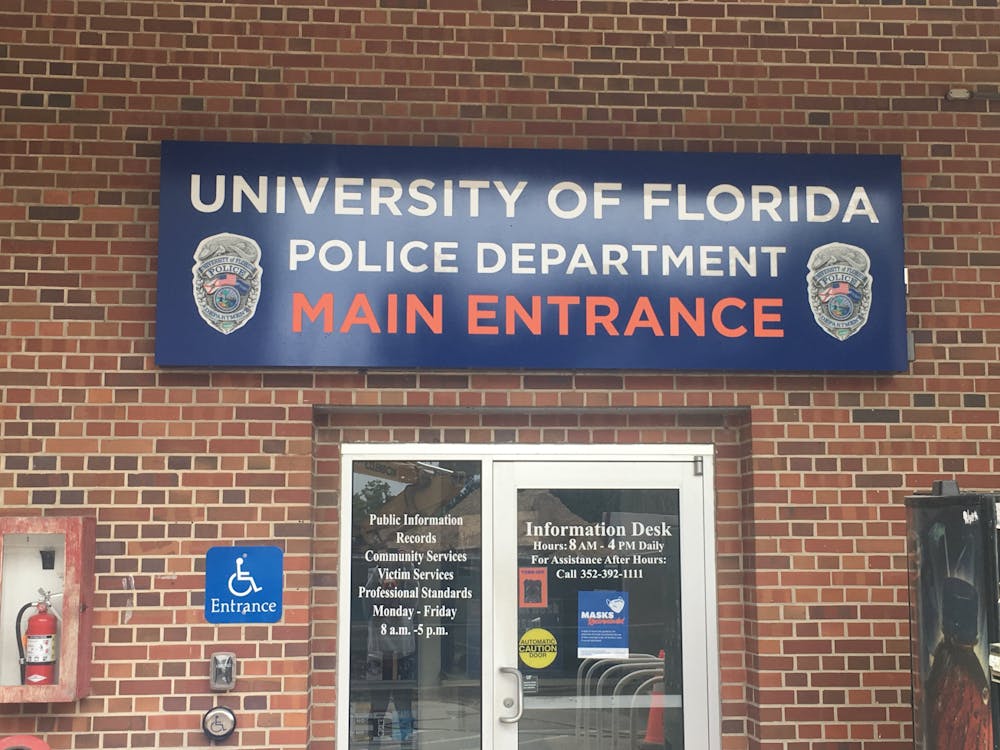UF’s police department will not change its campus safety protocols after recent school shootings invoked fear nationwide, but it will implement a first-of-its-kind program in Fall: mental health counselors will partner with its officers.
The new initiative, called the Behavioral Health Co-Responder Support Team, will have one or two counselors employed by August, according to UFPD’s Assistant Director for Behavioral Services Meggen Tucker Sixbey. The department hired one clinician and hopes to onboard a second by the Fall semester.
“The hope for the future is that there will be a counselor 24/7/365 paired with an officer,” Sixbey said.
UFPD’s model mirrors nationwide city and county programs that deploy both a counselor and an officer responding to calls. If the situation is deemed safe, the officer will leave, and the counselor will stay as long as needed to connect the affected persons with appropriate resources.
UF Co-Responder clinicians respond to calls with situations involving a mental health component, UFPD Captain Latrell Simmons and Sixbey wrote in an email, such as someone who is suicidal, appears disoriented or is in an escalated emotional state.
“Police get called for so many non-police matters,” Sixbey said. “I think a lot of departments across the country are saying, ‘What else can we do?’”
UFPD Officer Scott Silver declined to give specific details about upcoming UFPD tactical training but said the recent shooting at Robb Elementary School in Uvalde, Texas, sparked conversation about what did and did not work for law enforcement during the tragedy.
Officers regularly patrol campus and train for active shooter situations, Simmons said. The community service department also provides presentations, active assailant training and GatorSAFE app tutorials to professors and organizations upon request.
In the event of a shooting, UFPD would need to rule the scene safe before it deploys counselors, Simmons said. Co-responder clinicians would work with a larger counseling organization, such as the Counseling and Wellness Center, to address incidents’ repercussions.
People should follow the RUN HIDE FIGHT protocol, Silver said, which directs people to run if the assailant’s location is known, hide if the shooter’s location is unknown and fight as a last resort in active shooter situations.
Everyone should also take three to five seconds to come up with an escape plan when they walk into a new room, UFPD Lieutenant Jacob Pruitt, an active shooter training course instructor who taught UFPD officers, said.
Pruitt’s active shooter safety course is a priority for new UF hires. Library staff is required to complete annual training, and every College of Medicine employee hired in the last two years has taken the course.
Hope Lee, a 20-year-old public relations and piano performance senior, said she assumed there were resources for active shooter training, but she wasn’t told about any. She learned what to do in “dangerous situations” when she trained for her student assistant position at Newell Hall in Fall 2021, but she said she did not learn what to do with active shooters.
Lee relies on the GatorSAFE app, which warns her of potential nearby sexual assaults and kidnappings.
“If I didn't check those, I would have never known,” Lee said. “For all I know, that could have been me or my roommates.”
She said UF is not present enough in conversations students regularly have about active shooters; students should still try to be aware, but the university holds the responsibility to inform and protect students, she said.
“We have to all put into perspective that this can happen anywhere, and we need to be vigilant at all times,” Lee said. “I do have that subconsciously hiding in the back of my head.”
A behavioral consultation team at UF meets once a week to discuss any threats to the student community. UFPD, the CWC, the Department of Housing and Residence Education, Human Resources, Ombuds office, Office for Accessibility and Gender Equity, the Dean of Students Office and the General Counsel’s office all have representation, Sixbey said.
UFPD was one of the original six departments chosen to be a learning site for the U.S. Department of Justice’s police-mental health collaboration program, which encourages partnerships with health care providers and mental health advocates to provide safety for all, effectively respond to calls, improve access to the services and support people with mental health problems.
Today, there are 14 total learning sites, including UFPD. Other police departments include the Los Angeles Police Department, Miami-Dade Police Department and the Salt Lake City Police Department.
The developing counselor program will reflect models like the Eugene, Oregon, based CAHOOTS, Portland Street Response and Denver STAR, Sixbey said.
The CWC’s staff also worked with officers during crisis intervention team programs to learn how to better handle students with mental distress living in on-campus housing, said Dr. Rosa West, the assistant director of outreach and consultation for the CWC.
Dr. West looks forward to spreading the word about UFPD’s initiative and reassuring students who may need to contact the police that they can feel safe doing so.
“I think that’s where UF kind of stands above the rest,” West said. “We are innovative, especially around things related to mental health.”
Contact Troy Myers at tmyers@alligator.org. Follow him on Twitter @Troy_Myers1.
Contact Kyle Bumpers at kbumpers@alligator.org. Follow him on Twitter @BumpersKyle.

Troy is the criminal justice reporter and a fourth-year journalism major with an outside focus in business administration. He previously studied accounting for two years at Santa Fe College but has since transferred to UFCJC. When Troy isn’t writing, he enjoys going to the beach and spending time with his dog, identical twin brother and family.
Kyle Bumpers is a fourth-year journalism major and the sports editor of The Alligator. In his free time, he cries about Russell Wilson and writes an outrageous amount of movie reviews on Letterboxd.






